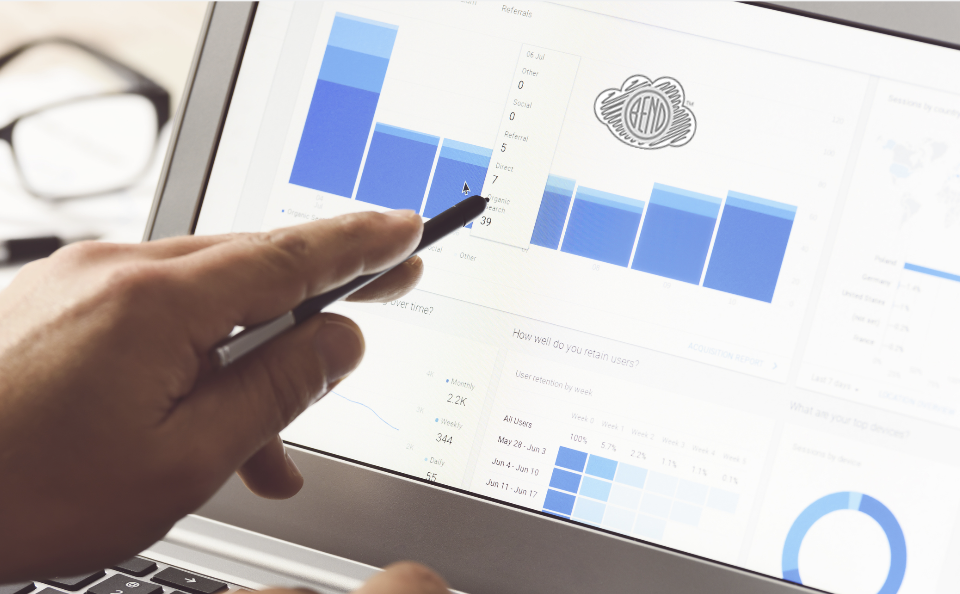SEO Metrics Every Business Should Track with Bend Cloud
It’s no secret that SEO is a complex field. There are hundreds of different ranking factors, and new algorithm updates can change the landscape overnight. As a result, it can be difficult for businesses to know which SEO metrics to keep track of.
This article will look at some of the most important metrics every business should track. Tracking of these metrics is done by an outside agency such as Bend Cloud. By hiring an agency to monitor these metrics, you can gain valuable insights into your website’s performance. From there you can make informed decisions about your SEO strategy.
1. Organic Traffic
Organic traffic is a key SEO metric that any business should track. It tells the company how many website visitors come directly from search engine results rather than through other sources such as social media or advertisements.
Tracking organic traffic allows us to measure the effectiveness of our SEO efforts and see which of your pages perform best with search engines. This data can help inform decisions about which keywords to target and where time and resources should be allocated to maximize your return on investment from SEO initiatives.
Search Engine Optimization Facts vs. Fiction
2. Traffic-Generating Keywords
Knowing which keywords drive traffic to your site is essential for any business. If we can understand what words and phrases people use when they search for a product or service you offer, we can optimize your website to ensure that more users find what they’re looking for and become customers.
Bend Cloud optimizes page titles, content, and URLs to help your web pages appear in more relevant searches. This also increases organic traffic coming to your website. Additionally, keeping track of which keywords are driving the most visits to your site can inform decisions on topics to focus on in upcoming marketing campaigns or products/services to spin off from existing offerings.
App Development Mistakes to Avoid
3. Average Time Spent on Each Page
Understanding the average time visitors spend on each page of your website is critical for its success. This SEO metric helps to identify pages generating engagement and keeping users interested. This can indicate as well which pages need attention or redesigns.
A page with a low average time spent indicates there are issues with the page.
Longer average times may suggest that the page’s content is being read and processed. Equally, it could mean that people are stuck in an unhelpful loop or are needing help finding what they need. Therefore, careful analysis of this metric is essential for keeping visitors engaged and returning to your website.
4. Bounce Rate
Bounce rate is a crucial SEO metric that every website must track and analyze. It refers to the percentage of visitors who leave a page without navigating any further. This might indicate that they didn’t find what they were looking for.
However, it could also mean that your content was exactly what they needed, but they achieved their goal without having to visit the rest of your site. As such, it’s essential for us to thoroughly analyze bounce rate data in conjunction with other metrics, such as time spent on the page and organic traffic, to better understand whether your bounce rate is good or bad.
Everything You Need to Know About the Cloud
5. Average Click-Through Rate on the SERPs
The average click-through rate (CTR) on search engine result pages is an important SEO metric for us to consider. CTR is determined by the number of impressions each link on the SERP gets divided by the number of clicks it receives. Generally, you can expect higher CTRs in positions 1-3 and then decreased ones thereafter.
Understanding average click-through rates on the SERPs is key to optimizing visibility and volume in organic searches. However, the value of these metrics will vary based on several factors. These factors may include specific industry norms and competition in the SERPs. Thus, analyzing click-through rates can help inform adaptive strategies that involve continuously improving search engine optimization practices.
6. Conversion Rate
Conversion rate is an important SEO metric for any business and should be tracked regularly. It helps measure how effective the website is at turning visitors into customers. To do this, we need to count the total number of leads or sales generated (conversions) divided by the total number of site visits (traffic).
The higher a website’s conversion rate, the better it is at turning visitors into customers. High conversion rates suggest that your website and content are effectively engaging users and helping them to complete the desired action. Conversely, low conversion rates indicate that you need to review your website design, content, and marketing messages.
How to Increase Customer Retention
7. Backlinks
Backlinks are essential in SEO, as they can help a web page rank higher in search engine results pages. A backlink is when one website links to another, which can help increase visibility and traffic for the linked page.
Monitoring how many backlinks your site has over time is vital for determining whether your strategy is working. A sudden increase in backlinks could suggest that you’re gaining more visibility. A decrease might indicate a problem with the content or an issue with external links pointing to your site.
The quality of those backlinks is also important, as search engines give more weight to links from high-quality websites than those from low-quality sites. Thus, it’s essential to analyze the backlinks pointing to your website and ensure they come from reputable sources.
8. Page Speed
Page speed is another critical SEO metric to measure, as it can affect the user experience and impact how well your website performs in search engine results. It refers to the time a server takes to respond to a user request and the time it takes for a page to load within a browser.
Poor page speed can result in slow loading times and potentially cost you money, as users may not wait longer than 3 seconds for a page to load before going elsewhere. As such, it’s crucial to monitor page speed regularly and optimize your website accordingly.
To improve page speed, optimize images, minify scripts and stylesheets, preload resources, and cache static content, all of which will result in pages loading faster while increasing user engagement by improving overall usability and performance.
How The Algorithm Affects Your Site
9. Revenue Per Visitor
Revenue per visitor (RPV) is a metric used to measure how much an average user spends during their visit. It’s calculated by dividing the total revenue generated by the site by the number of visitors to that page.
This metric can provide insight into how customers engage with your website, as it measures the total revenue generated from each user. The higher the RPV, the better a website converts visitors into paying customers.
Monitoring this SEO metric can help you understand how well your website or page performs and inform decisions around content, design, and marketing strategies. It’s essential to track this metric over time to ensure that changes to the website result in increased revenue.
10. Social Engagement
Social engagement metrics measure the number of interactions, likes, comments, and shares that content receives on social media platforms.
Tracking this metric gives insight into how well users engage with your content and provides an understanding of how much reach your content has across different platforms. The more people who interact with and share your content, the higher your visibility and reach on social media sites.
In addition to monitoring the number of interactions, it’s also important to track sentiment – whether people are positively or negatively engaging with your content. This will allow you to understand how users perceive your brand and can help inform decisions around content creation or marketing campaigns.
The Ins and Outs of Social Media Marketing
Conclusion
By monitoring the right metrics, you can gain insight into how well your website or page performs and make informed decisions to improve user engagement and performance. Monitoring metrics such as backlinks, page speed, revenue per visitor, and social engagement will help ensure that your SEO strategy is effective and that you deliver a positive user experience. As a result, you will gain higher visibility, improved ranking, and increased revenue.
Contact us to start tracking your SEO metrics today!


